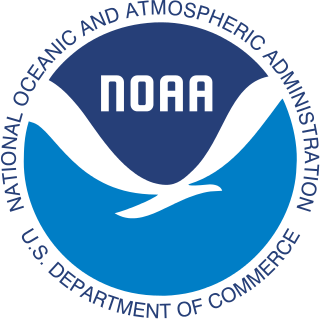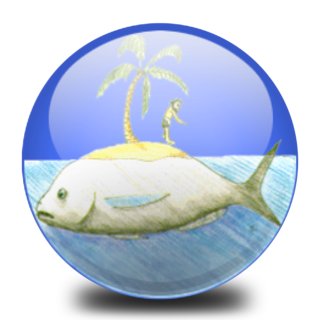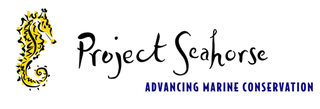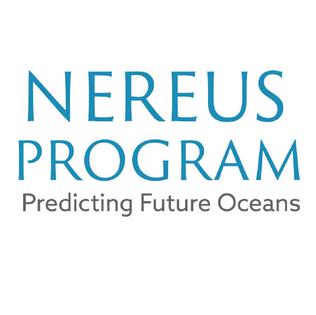
The National Oceanic and Atmospheric Administration is an American scientific agency within the United States Department of Commerce that focuses on the conditions of the oceans, major waterways, and the atmosphere.

Upwelling is an oceanographic phenomenon that involves wind-driven motion of dense, cooler, and usually nutrient-rich water towards the ocean surface, replacing the warmer, usually nutrient-depleted surface water. The nutrient-rich upwelled water stimulates the growth and reproduction of primary producers such as phytoplankton. Due to the biomass of phytoplankton and presence of cool water in these regions, upwelling zones can be identified by cool sea surface temperatures (SST) and high concentrations of chlorophyll-a.
FishBase is a global species database of fish species. It is the largest and most extensively accessed online database on adult finfish on the web. Over time it has "evolved into a dynamic and versatile ecological tool" that is widely cited in scholarly publications.

Generally, a fishery is an entity engaged in raising or harvesting fish which is determined by some authority to be a fishery. According to the FAO, a fishery is typically defined in terms of the "people involved, species or type of fish, area of water or seabed, method of fishing, class of boats, purpose of the activities or a combination of the foregoing features". The definition often includes a combination of fish and fishers in a region, the latter fishing for similar species with similar gear types.

A conventional idea of a sustainable fishery is that it is one that is harvested at a sustainable rate, where the fish population does not decline over time because of fishing practices. Sustainability in fisheries combines theoretical disciplines, such as the population dynamics of fisheries, with practical strategies, such as avoiding overfishing through techniques such as individual fishing quotas, curtailing destructive and illegal fishing practices by lobbying for appropriate law and policy, setting up protected areas, restoring collapsed fisheries, incorporating all externalities involved in harvesting marine ecosystems into fishery economics, educating stakeholders and the wider public, and developing independent certification programs.

Daniel Pauly is a French-born marine biologist, well known for his work in studying human impacts on global fisheries. He is a professor and the project leader of the Sea Around Us Project at the UBC Institute for the Oceans and Fisheries at the University of British Columbia. He also served as Director of the UBC Fisheries Centre from November 2003 to October 2008.

Marine ecosystems are the largest of Earth's aquatic ecosystems and are distinguished by waters that have a high salt content. These systems contrast with freshwater ecosystems, which have a lower salt content. Marine waters cover more than 70% of the surface of the Earth and account for more than 97% of Earth's water supply and 90% of habitable space on Earth. Marine ecosystems include nearshore systems, such as the salt marshes, mudflats, seagrass meadows, mangroves, rocky intertidal systems and coral reefs. They also extend outwards from the coast to include offshore systems, such as the surface ocean, pelagic ocean waters, the deep sea, oceanic hydrothermal vents, and the sea floor. Marine ecosystems are characterized by the biological community of organisms that they are associated with and their physical environment.

The Virginia Institute of Marine Science (VIMS) is one of the largest marine research and education centers in the United States. Founded in 1940, VIMS is unique among marine science institutions in its legal mandate to provide research, education, and advisory service to government, citizens, and industry. Funding for VIMS comes from the Commonwealth of Virginia, grants and contracts from federal and state agencies, and private giving. The School of Marine Science (SMS) at VIMS is the graduate school in marine science for the College of William & Mary. Offering both M.S. and Ph.D. degrees in marine science, the school has 57 faculty members, an enrollment of 80-100 students, and includes 4 academic departments. VIMS' main campus is located in Gloucester Point, Virginia.

Ecopath with Ecosim (EwE) is a free and open source ecosystem modelling software suite, initially started at NOAA by Jeffrey Polovina, but has since primarily been developed at the formerly UBC Fisheries Centre of the University of British Columbia. In 2007, it was named as one of the ten biggest scientific breakthroughs in NOAA's 200-year history. The NOAA citation states that Ecopath "revolutionized scientists' ability worldwide to understand complex marine ecosystems". Behind this lie more than two decades of development work in association with Villy Christensen, Carl Walters, Daniel Pauly, and other fisheries scientists, followed with the provision of user support, training and co-development collaborations. In 2013, development efforts were centralized under Ecopath International Initiative, Spain. Per January 2019 there are an estimated 8000+ users across academia, non-government organizations, industry and governments in 150+ countries.
Ussif Rashid Sumaila is a professor of ocean and fisheries economics at the University of British Columbia, Canada, and the Director of the Fisheries Economics Research Unit at the UBC Institute for the Oceans and Fisheries. He specializes in bioeconomics, marine ecosystem valuation and the analysis of global issues such as fisheries subsidies, IUU fishing and the economics of high and deep seas fisheries. Sumaila has experience working in fisheries and natural resource projects in Norway, Canada and the North Atlantic region, Namibia and the Southern African region, Ghana and the West African region and Hong Kong and the South China Sea. He received his Bachelor of Science degree with honours from Ahmadu Bello University University in Nigeria and received his PhD from Bergen University in Norway.

Janet Gibson is a biologist and zoologist from Belize. She was awarded the Goldman Environmental Prize in 1990 for her efforts on conservation of the marine ecosystems along the Belizean coast, in particular the barrier reef system. The Belize Barrier Reef was granted UNESCO World Heritage status in 1996, through efforts of Gibson and others. She is the current director of the Belize Wildlife Conservation Society.
Villy Christensen is an ecosystem modeller with a background in fisheries science. He is known for his work as a project leader and core developer of Ecopath, an ecosystem modelling software system widely used in fisheries management. Ecopath was initially an initiative of the NOAA, but since primarily developed at the UBC Fisheries Centre of the University of British Columbia. In 2007, it was named as one of the ten biggest scientific breakthroughs in NOAA’s 200-year history. The citation states that Ecopath “revolutionized scientists’ ability worldwide to understand complex marine ecosystems".

Fishing down the food web is the process whereby fisheries in a given ecosystem, "having depleted the large predatory fish on top of the food web, turn to increasingly smaller species, finally ending up with previously spurned small fish and invertebrates".
SeaLifeBase is a global online database of information about marine life. It aims to provide key information on the taxonomy, distribution and ecology of all marine species in the world apart from finfish. SeaLifeBase is in partnership with the WorldFish Center in Malaysia and the UBC Fisheries Centre at the University of British Columbia. Daniel Pauly is the principal investigator and it is coordinated by Maria Lourdes D. Palomares. As of October 2016, it included descriptions of 74,000 species, 47,700 common names, 12,400 pictures, and references to 31,700 works in the scientific literature. SeaLifeBase complements FishBase, which provides parallel information for finfish.

Project Seahorse is a marine conservation organization committed to the conservation and sustainable use of coastal marine ecosystems in general, and seahorses in particular.

Amanda Vincent is a Canadian marine biologist and conservationist, one of the world's leading experts on seahorses and their relatives. She currently holds the Chair of the IUCN SSC Seahorse, Pipefish and Seadragon Specialist Group and is the marine representative on the IUCN’s International Red List Committee as well as being the Chair of its Marine Conservation Subcommittee. She previously held the Canada Research Chair in Marine Conservation at the UBC Fisheries Centre at the University of British Columbia, Canada from 2002 to 2012. Vincent co-founded and directs Project Seahorse, an interdisciplinary and international organisation committed to conservation and sustainable use of the world's coastal marine ecosystems.
The following outline is provided as an overview of and topical guide to fisheries:

The Nereus Program is a global interdisciplinary initiative between the Nippon Foundation and the University of British Columbia that was created to further our knowledge of how best to attain sustainability for our world’s oceans. In addition to the Nippon Foundation and UBC, the program partners with University of Cambridge, Duke University, Princeton University, Stockholm University, United Nations Environment Program-World Conservation Monitoring Centre and Utrecht University. The program is built around three core objectives: to conduct collaborative ocean research across the natural and social sciences, to develop an interdisciplinary network of experts that can engage in discussion of complex and multifaceted questions of ocean sustainability, and to transfer these ideas to practical solutions in global policy forums.

William Cheung is a marine biologist, well known for his research on the impacts of climate change on marine ecosystems and fisheries. He currently works as director of science of the Nereus Program and is also an associate professor at the University of British Columbia, as well as Leader at the UBC Changing Ocean Research Unit.

Yoshitaka Ota is a social anthropologist, specializing in indigenous fisheries, climate change risk, global ocean governance, sustainable fishing business solutions, and coastal management and research communication. He is currently employed as the Nereus Program Director (Policy) and as a Research Assistant Professor for the School of Marine and Environmental Affairs at the University of Washington.
















